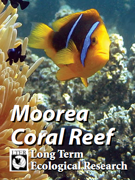 ©2026 Biological and Chemical Oceanography Data Management Office.
©2026 Biological and Chemical Oceanography Data Management Office.Funded by the U.S. National Science Foundation
NSF Award Abstract:
Coral reefs provide important benefits to society, from food to exceptional biodiversity to shoreline protection and recreation, but they are threatened by natural perturbations and human activities, including those causing global-scale changes. These pressures increasingly are causing coral reefs to undergo large, often abrupt, ecological changes where corals are being replaced by seaweeds or other undesirable organisms. Historically, the major agent of disturbance to coral reefs has been powerful storms, but in recent decades, episodes of mass coral bleaching from marine heat waves have become more frequent and severe as the temperature of ocean surface waters continues to rise. Coral reefs are further stressed by local human activities that cause nutrient pollution and deplete herbivorous fishes that control growth of seaweeds. Studying how coral reefs respond to these two types of disturbance under different levels of nutrient pollution and fishing provides essential information on what affects the ability of coral reefs to buffer environmental change and disturbances without collapsing to a persistent, degraded condition. The fundamental goals of the Moorea Coral Reef Long Term Ecological Research program (MCR LTER) are to understand how and why coral reefs change over time, to assess the consequences of these changes, and to contribute scientific knowledge needed to sustain coral reef ecosystems and the important societal services they provide. This research improves understanding and management of coral reefs, which benefits all groups concerned with the welfare of this ecologically, economically and culturally important ecosystem. In addition to academic communities, scientific findings are communicated to interested individuals, non-governmental organizations, island communities and governmental entities. These findings also are integrated into K-12, undergraduate, graduate and public education activities through a multi-pronged program that includes inquiry-based curricula, interactive and media-based public education programs, and internet-based resources. MCR?s research, training, education and outreach efforts all emphasize broadening participation in STEM fields and strengthening STEM literacy.
New research activities build on MCR LTER?s powerful foundation of long-term observations and broad ecological understanding of oceanic coral reefs to address the following core issues: How is the changing disturbance regime (recurrent heat waves in addition to cyclonic storms) altering the resilience of coral reefs, and what are the ecological consequences of altered resilience? Research activities are organized around a unifying framework that explicitly addresses how reef communities are affected by the nature and history of coral-killing disturbances, and how those responses to disturbance are influenced by the pattern of local human stressors. New studies answer three focal questions: (1) How do different disturbance types, which either remove (storms) or retain (heat waves) dead coral skeletons, affect community dynamics, abrupt changes in ecological state, and resilience? (2) How do local stressors interact with new disturbance regimes to create spatial heterogeneity in community dynamics, ecosystem processes, and spatial resilience? And (3) What attributes of coral and coral reef communities influence their capacity to remain resilient under current and future environmental conditions? These questions provide an unparalleled opportunity to test hypotheses and advance theory regarding ecological resilience and the causes and consequences of abrupt ecological change, which is broadly relevant across aquatic and terrestrial ecosystems.
This award reflects NSF's statutory mission and has been deemed worthy of support through evaluation using the Foundation's intellectual merit and broader impacts review criteria.
From http://www.lternet.edu/sites/mcr/ and http://mcr.lternet.edu/:
The Moorea Coral Reef LTER site encompasses the coral reef complex that surrounds the island of Moorea, French Polynesia (17°30'S, 149°50'W). Moorea is a small, triangular volcanic island 20 km west of Tahiti in the Society Islands of French Polynesia. An offshore barrier reef forms a system of shallow (mean depth ~ 5-7 m), narrow (~0.8-1.5 km wide) lagoons around the 60 km perimeter of Moorea. All major coral reef types (e.g., fringing reef, lagoon patch reefs, back reef, barrier reef and fore reef) are present and accessible by small boat.
The MCR LTER was established in 2004 by the US National Science Foundation (NSF) and is a partnership between the University of California Santa Barbara and California State University, Northridge. MCR researchers include marine scientists from the UC Santa Barbara, CSU Northridge, UC Davis, UC Santa Cruz, UC San Diego, CSU San Marcos, Duke University and the University of Hawaii. Field operations are conducted from the UC Berkeley Richard B. Gump South Pacific Research Station on the island of Moorea, French Polynesia.
MCR LTER Data: The Moorea Coral Reef (MCR) LTER data are managed by and available directly from the MCR project data site URL shown above. The datasets listed below were collected at or near the MCR LTER sampling locations, and funded by NSF OCE as ancillary projects related to the MCR LTER core research themes.
This project is supported by continuing grants with slight name variations:
Additional data for this site are managed by and directly available from the project data site: http://mcr.lternet.edu/data/

Lead Principal Investigator: Dr Russell J Schmitt
University of California-Santa Barbara (UCSB)
Principal Investigator: Dr Russell J Schmitt
University of California-Santa Barbara (UCSB)
Co-Principal Investigator: Deron Burkepile
University of California-Santa Barbara (UCSB)
Co-Principal Investigator: Robert Carpenter
California State University Northridge (CSUN)
Co-Principal Investigator: Peter J. Edmunds
California State University Northridge (CSUN)
Co-Principal Investigator: Sally Holbrook
University of California-Santa Barbara (UCSB)
Contact: Dr Russell J Schmitt
University of California-Santa Barbara (UCSB)
Long Term Ecological Research network [LTER]